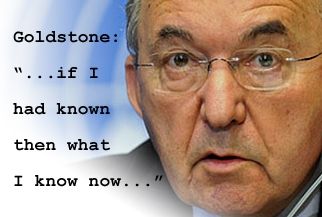When Judge Richard Goldstone published his famous op-ed reconsidering the Goldstone Report, he – perhaps unintentionally – revealed one of the predominant biases of the Goldstone Committee that produced the report. The committee, it appears, was operating under a deep-set assumption of moral equivalence between Israel and Hamas.
The same bias of moral equivalence can be seen in the coverage of the recent violence between Israel and Hamas in Gaza.
While virtually all mainstream news outlets covered the story as an action-reaction, started by Hamas’s attack on an Israeli school bus and carried on by Israel’s retaliatory strikes on targets in Gaza, the coverage gives the misleading impression that Israel and Hamas are morally equal.
What’s left out of the coverage is the element of intentionality. More specifically, it glosses over the reality that Hamas’s intention was to kill Israeli school children and Israel’s intention, in firing back, was to defend its citizens.
The distinction between the two sides is most clearly evident when their intentions are examined. The original, flawed Goldstone Report, however, was so mired by the biases of its authors that no distinctions were made.
Even Goldstone now admits that there was no evidence pointing to any Israeli intention to target Palestinian civilians during the Gaza war. In the absence of evidence pointing clearly in either direction, his “reasonable conclusion” was to assume Israeli guilt:
That the crimes allegedly committed by Hamas were intentional goes without saying — its rockets were purposefully and indiscriminately aimed at civilian targets.
The allegations of intentionality by Israel were based on the deaths of and injuries to civilians in situations where our fact-finding mission had no evidence on which to draw any other reasonable conclusion.
In other words, the committee decided that since Palestinian civilians suffered, Israel targeted them on purpose unless it proved otherwise – just as Hamas intentionally targeted Israeli civilians.
 Amazingly, the committee could not recognize that Israel’s sole intention for going to war in Gaza was to stop Hamas rocket fire targeting Israeli civilians. Had there been no rocket fire, there would have been no war.
Amazingly, the committee could not recognize that Israel’s sole intention for going to war in Gaza was to stop Hamas rocket fire targeting Israeli civilians. Had there been no rocket fire, there would have been no war.
But in a world of moral equivalence between aggressor and victim, intentions are irrelevant. Both sides fired and both sides caused civilian casualties. Therefore, both sides are morally equal.
This bias of moral equivalence – the failure to distinguish between Hamas’s intentional aggression against Israeli civilians, which “goes without saying” and Israel’s intention to protect its citizens against this aggression, for which there is apparently “no evidence” – is often reinforced in media coverage of the region.
As the violence escalated over the weekend, article after article focused on Israel’s retaliation to the trigger event – Hamas’s intentional attack on an Israeli school bus with an advanced anti-tank rocket.
This Associated Press article was typical of the coverage of the violence in Gaza:
Israel pounded Hamas targets in Gaza with air strikes and tank shells Saturday, killing four militants, Palestinian officials said, as Palestinian missiles reached deeper into Israel in the most intense round of fighting since the Gaza war.
In all, 18 Gazans have been killed and more than 65 wounded since Israel unleashed the strikes following a Hamas attack on an Israeli school bus Thursday. An anti-tank rocket struck the bus, seriously wounding a 16-year-old boy and injuring the driver.
It might seem reasonable to report, first and foremost, on casualties, especially when recounting the latest events. But a dry retelling of the actions without noting the intentionality behind them fails to convey the spirit of what happened.
Instead of presenting the events as Hamas intentionally attacking children on a school bus and Israel trying to prevent such attacks by pursuing those responsible, we get a play-by-play of the violence that has the strange ring of tit-for-tat attacks in a moral vacuum.
Time magazine even used the term tit-for-tat in its “teaser” – the one-line summary of the article – for its coverage of the Gaza flare-up.
The term suggests that all of the violence is essentially equal, as though Hamas’s intentions were irrelevant. In the AP article, it is Israel that “unleashed” strikes, as though the bus attack wasn’t really a trigger after all.
It is no wonder that people see the issue as a “cycle of violence.” When the media fails to make a distinction between Hamas’s aggression and Israel’s defense, it leaves out the essential element of the story that allows people to make sense of what’s happening.
But accurate reporting would show things as they truly are – with one side shooting precision missiles at school kids and firing rockets from within its own civilian population (see video below). Then people may understand there is no more equivalence between Israel and Hamas. Maybe even Goldstone is starting to see it.


